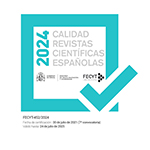El cocinero cómico: Maestro de los fogones y de la palabra
Résumé
Aunque tiene algunos antecedentes en la comedia doria siciliana y en la Comedia Antigua, la figura del cocinero adquiere una consistencia especial en la Comedia Media y Nueva, donde aparece ya perfectamente caracterizado. Junto a su total falta de vergüenza y su afición al robo, destaca entre sus rasgos definitorios la charlatanería, que con frecuencia emplea para esconder sus defectos. Con un lenguaje sentencioso y altamente elaborado expone en largos parlamentos las reglas de la cocina y su propia habilidad, para elevar su oficio a la categoría de arte y embaucar a sus interlocutores.Téléchargements
##submission.format##
Licence
La revista Cuadernos de Filología Clásica. Estudios griegos e indoeuropeos, para fomentar el intercambio global del conocimiento, facilita el acceso sin restricciones a sus contenidos desde el momento de su publicación en la presente edición electrónica, y por eso es una revista de acceso abierto. Los originales publicados en esta revista son propiedad de la Universidad Complutense de Madrid y es obligatorio citar su procedencia en cualquier reproducción total o parcial. Todos los contenidos se distribuyen bajo una licencia de uso y distribución Creative Commons Reconocimiento 4.0 (CC BY 4.0). Esta circunstancia ha de hacerse constar expresamente de esta forma cuando sea necesario. Puede consultar la versión informativa y el texto legal de la licencia.










